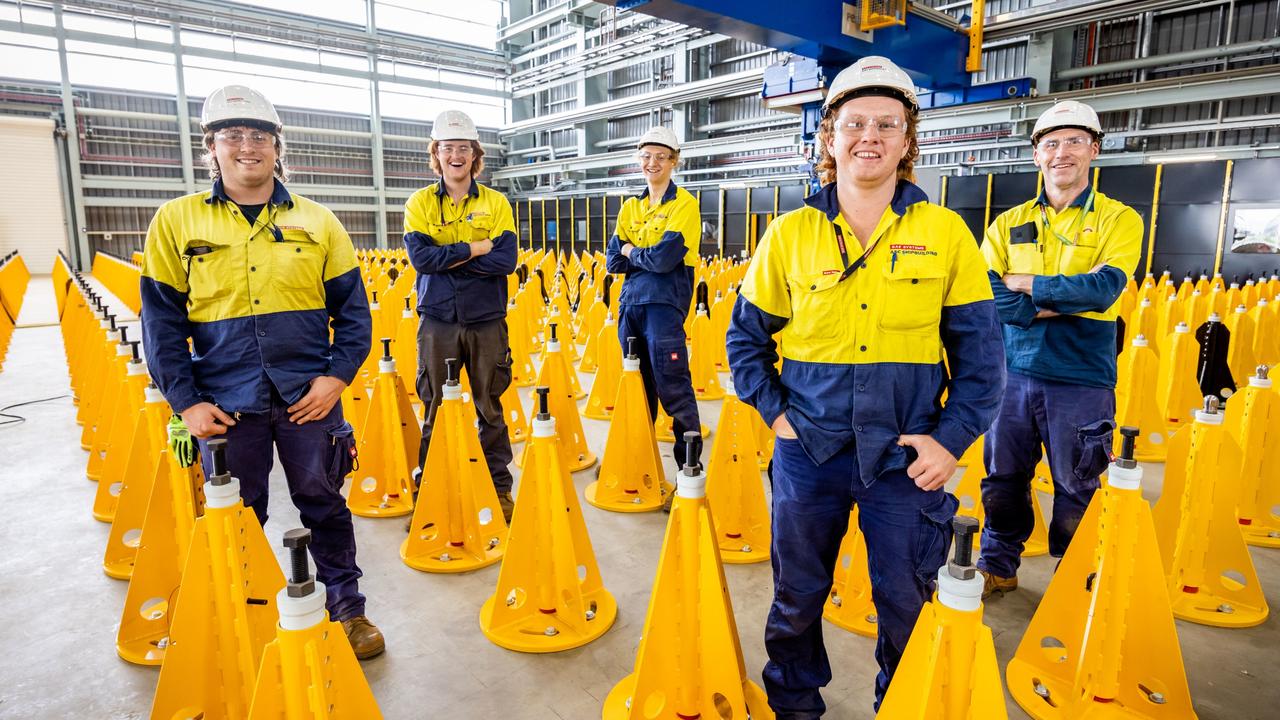Mining and infrastructure companies poaching skilled employees from defence projects
Australia’s skills crisis is placing serious pressure on big defence companies to train up workers on a massive scale – but another major industry is making that difficult.
Companies in the booming mining and infrastructure sectors are actively targeting and recruiting workers from defence projects because they are so highly skilled, industry leaders have warned.
This is escalating the wage base and has sparked urgent calls from defence heavyweights to help train and hold on to valuable workers.
Ahead of the federal government’s much anticipated Jobs and Skills summit in Canberra this week, BAE Systems Managing Director Craig Lockhart is pushing for greater action to ease the burden of early career programs often shouldered by defence companies.
“If industrial programs are going to be accelerated or still growing in an extremely dynamic market, then it’s challenging for industry to also fight on all fronts as far as recruiting and retaining people are concerned,” Mr Lockhart told The Advertiser.
“It leaves little room for the same leadership population to be working with academic institutions to increase the number of students coming in.”
Adding to the challenges, Mr Lockhart said mining, resources and infrastructure companies were treating the defence industry as a “stealing or poaching ground”.
BAE is expected to employ about 2500 people for the future Hunter-class frigates during the peak of the $45bn program, up from 1600 people now.
Australia’s plans to overhaul the Hobart-class Air Warfare Destroyers and build at least eight nuclear-powered submarines at Adelaide’s Osborne shipyard will place additional pressure on defence companies to source skilled workers.


On Monday, the BAE boss attended a pre-skills summit roundtable meeting in Canberra.
Mr Lockhart said industry leaders agreed all sectors were suffering with “record levels of attrition and many jobs going unfilled”.
There were also calls for the skilled migrant visa system to be “radically overhauled” to address workforce shortages.
Saab Australia Managing Director Andy Keough said skills issues were inflicting every sector across the economy, but defence had unique challenges.
“It takes a long time to train some of those very skilled people. Usually they’ve got double degrees with honours – that’s a five year pipeline until they hit us and then we’ve got two-year graduate programs to take them through,” he said.
Mr Keough also said Saab and other defence companies are unable to hire a “big chunk” of university graduates due to various security requirements.
At any given time, 10 per cent of Saab’s workforce is made up of graduates participating in the company’s two-year program.
BAE has doubled its graduate intake, filling about 110 graduate roles for 2023 while also boosting the number of interns and work experience positions for students.
It has also partnered with Ai Group and Victoria University to launch a program that integrates workplace learning with university education.

HUNTER-CLASS REMAINS FRAUGHT WITH ‘RISKS’
The $45bn Hunter-class frigate program remains fraught with risks that could further slow down the progress of the build, senior Defence Officials have warned, despite BAE Systems recovering more than a year’s worth of delays.
Construction on the first of nine anti-submarine frigates is now due to begin in May next year, 13 months earlier than expected as BAE irons out several issues plaguing the design of the parent ship – UK’s Type 26 frigate.
While the timeline update has been celebrated within the company, the Deputy Secretary of National Naval Shipbuilding, Tony Dalton, warned the program remained prone to possible issues.
It’s the reason why – despite the earlier construction start date – BAE has not brought forward the revised December 2031 deadline to deliver the first ship to the navy.

“This is still a program that is exposed to a considerable number of risks, and we knew that at the very beginning,” Mr Dalton said during a BAE-sponsored tour of the Osborne shipyard for journalists and defence officials.
The complex Hunter-class project involves integrating the highly advanced Aegis combat system with a radar from Australia, in a ship design from the UK.
“No one has done that before,” Mr Dalton said.
“Some of the things that we’re trying to manage here are really, really complex and that schedule, especially for the first batch of (three) ships has got allowance for us to manage that risk.”
BAE Systems Australia managing director Craig Lockhart said it would “continue to be a high-risk program for some time”.
“It won’t be until HMS Glasgow (the UK’s first Type 26 ship) gets into full tests and trials we’ll we be able to fully mitigate some of the latent risks that might be in the design of the ship,” Mr Lockhart said.





